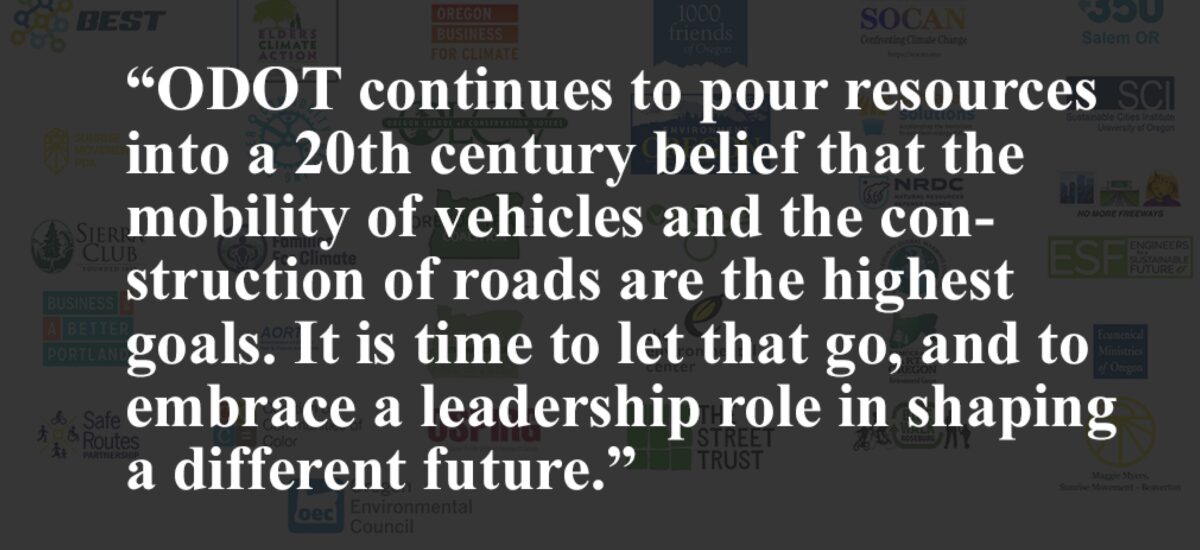As I shared in my previous story, anxiety about the climate crisis is at an all-time high. As a result, transportation and climate activists have joined forces to sharpen their arguments and tactics in recent weeks.
We’re in a strange moment in Portland and Oregon right now where there’s vast awareness of the negative impacts of a warming planet, yet most elected leaders and high-level bureaucrats are just moving ahead with business as usual. And when it comes to transportation, that status quo means that car-centric freeways projects — ones that will make driving easier and increase capacity for fossil-fueled mobility — continue soak up the lion’s share of funding at the expense of everything else.
As I type this, a group of youth climate activists are protesting in front of the Governor’s Mansion in Salem in hopes of persuading Kate Brown to accept their demands to veto an Oregon Department of Transportation spending bill and place an immediate moratorium on freeway expansion projects.
Advertisement
And just yesterday, in an unprecedented display of unified and pointed concern about ODOT’s priorities, 33 transportation, environmental and social justice organizations led by Oregon Environmental Council (and including The Street Trust, Community Cycling Center, Safe Routes Partnership, Better Eugene Springfield Transportation, Business for a Better Portland, Sierra Club, Coalition of Communities of Color and many others) signed and sent a letter (PDF) to the Oregon Transportation Commission imploring them to act with more urgency.
Here are a few excerpts from that letter:
The investments that ODOT has made to address climate, while valuable, are profoundly insufficient given the scale and urgency with which we must reduce emissions to avert the worst of the grim and chaotic future we are already experiencing.
It is time — it is past time — for ODOT to be responsible stewards for Oregon’s communities and act with the urgency necessary to meet the needs of Oregon communities. Oregon’s transportation system must evolve beyond a system designed around the efficiency of single vehicle trips to a system that emphasizes the efficient, decarbonized movement of people and goods.
ODOT … as a whole continues to pour resources into a 20th century belief that the mobility of vehicles and the construction of roads are the highest goals. It is time to let that go, and to embrace a leadership role in shaping a different future.
Advertisement
The coalition says ODOT’s current draft Climate Action Plan, “Does not reflect the urgency or the size of the need to act.” And in refreshing clarity, they write that, “ODOT has to stop spending money on making it easier to drive more, and spend that money instead on making it easier to take transit, bike, or walk.”
A list of “immediate actions” includes a demand to implement the Oregon Bicycle and Pedestrian Plan by 2035 and to, “Immediately pause adding new capacity for single occupancy vehicles, including ‘auxiliary lanes,’ and establish a policy of instituting equitable congestion pricing for demand management before adding capacity in order to ensure efficient right-sizing of the system.”
And finally, at a meeting of Metro’s Joint Policy Advisory Committee on Transportation (a group of top elected officials from around the region) this morning, the agenda included more funding for two highway expansions in our region: I-205 and Highway 217. But before JPACT members could adopt the spending, Portland climate activist Adah Crandall delivered a passionate, rage-filled testimony — which was cut short when her mic was cut off. Listen to a slightly edited version of it below:
— Jonathan Maus: (503) 706-8804, @jonathan_maus on Twitter and jonathan@bikeportland.org
— Get our headlines delivered to your inbox.
— Support this independent community media outlet with a one-time contribution or monthly subscription.


